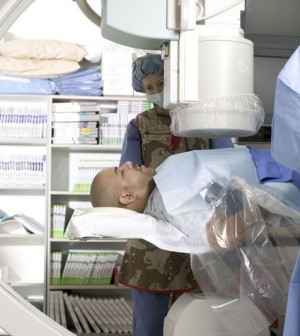- Recognizing the Signs of Hypothyroidism
- 10 Strategies to Overcome Insomnia
- Could Artificial Sweeteners Be Aging the Brain Faster?
- Techniques for Soothing Your Nervous System
- Does the Water in Your House Smell Funny? Here’s Why
- Can a Daily Dose of Apple Cider Vinegar Actually Aid Weight Loss?
- 6 Health Beverages That Can Actually Spike Your Blood Sugar
- Treatment Options for Social Anxiety Disorder
- Understanding the Connection Between Anxiety and Depression
- How Daily Prunes Can Influence Cholesterol and Inflammation
Current Colon Cancer Screening Guidelines Might Miss Some Patients


FRIDAY, Oct. 25Current U.S. colon cancer screening guidelines may result in 10 percent of colon cancers being missed in people with a family history of colon polyps that can lead to cancer, a new study suggests.
“The biggest surprise was the percentage of missed cancers under the current guidelines. We figured there would be a few percent, but 10 percent is a large number,” study author Dr. N. Jewel Samadder, of the Huntsman Cancer Institute at the University of Utah, said in a university news release.
Colorectal cancer is the third most common cancer in the United States and the second deadliest.
Samadder’s team looked at data from nearly 127,000 people, aged 50- to 80, who underwent colonoscopy in Utah between 1995 and 2009. They found that first-degree relatives — parents, siblings, children — of people with adenomas (polyps linked to cancer) or advanced adenomas had a 35 percent to 70 percent increased risk of developing colon cancer than relatives of patients without these growths.
Second-degree relatives (aunts, uncles, grandparents) and third-degree relatives (cousins, nieces, nephews, great-grandparents) of people with adenomas were also at increased risk for colon cancer, according to the study published online Oct. 25 in the journal Cancer.
“We expected to see increased risk in first-degree relatives, but we weren’t sure the risk would also be higher for more distant relatives in multiple generations,” Samadder said.
Current national guidelines for colon cancer screening recommend colonoscopy every 10 years starting at age 50 for the general population. But first-degree relatives of people diagnosed with either colorectal cancer or advanced adenomas before age 60 should have a colonoscopy every five years beginning at age 40, according to the guidelines.
However, screening recommendations for second- and third-degree relatives of people diagnosed before age 60 are the same as for the general public.
So, the new findings “raise the issue of whether some level of more aggressive screening should be considered, not only for first-degree relatives of patients with polyps diagnosed at or below age 60, but also for those first-degree relatives of patients diagnosed above age 60,” Samadder said.
One expert not connected to the study said the findings may be important, but it’s often difficult to assess a patient’s family history when it comes to colon cancer.
“This information is important not only to specialists who treat colon and rectal and cancer but all primary care providers who recommend screening programs for their patients,” said Dr. Jerald Wishner, director of colorectal surgery at Northern Westchester Hospital in Mount KIsco, NY.
However, he added that, “It will be difficult to apply this information in everyday clinical practice. I regularly see patients who know their relatives have had surgery for cancer don’t know the type. Finding out if their relatives have had adenomas or advanced adenomas will be very difficult. This will be further complicated as we seek information about second or third degree relatives.”
More information
The U.S. National Cancer Institute has more about colorectal cancer screening.
Source: HealthDay
Copyright © 2026 HealthDay. All rights reserved.










